
Think twice, even when you travel
Your choice, one of many (or maybe not).
Every choice in our lives has consequences, we know that. The choices in our relationships, in our work... where to live, who to be with, what compromises to make. The decisions we make lead us to live one possible scenario, rather than another.
There are choices, many more than one might think, that don’t just have consequences for ourselves or the (relatively few) people around us. Some choices start at one point, but their consequences reach another, potentially very far away.
These are individual choices, which, when added to the choices of other individuals, form collective and mass decisions. The consequences of this "sum of choices" are clearly impactful.
Tourism is one of the most enriching experiences we can have, but it also carries responsibility. Often, we choose a trip or a vacation based on the destination, the activities, and the experiences we want to have, forgetting that every choice we make in this context has weight. From the type of travel we choose to how we interact with the environment and local communities, every aspect of our tourism experience is a choice that can either promote sustainability or contribute to worsening environmental, social, and human conditions. In fact, responsible tourism is not just about environmental sustainability: it’s also about being aware of our role as visitors, respecting local cultures and traditions, and the need to make a positive contribution to the communities we visit.
Choosing to travel responsibly means being informed, respecting the environment, and promoting practices that not only preserve the place but also improve the lives of its inhabitants.
One of the main challenges in adopting responsible tourism practices is the lack of awareness and understanding among travelers, tourism operators, and local communities about the principles and practices of responsible tourism.
Sailsquare is a small company, but with a large community of sea-loving travelers behind it, and we at the team believe that the greatest impact we can have is to consistently promote, to the thousands of people who make up our community, a culture of respect for the marine environment and a low-impact travel style.
So let’s reflect on what we can do. We can choose to travel less, but better, investing time and resources in meaningful experiences. We can opt for sustainable means of transportation, support local businesses, and respect the places we visit. Every small action, from refusing single-use plastic on board to using appropriate products, contributes to tourism with a positive impact.
What to do and what not to do: not advice, but reflections.
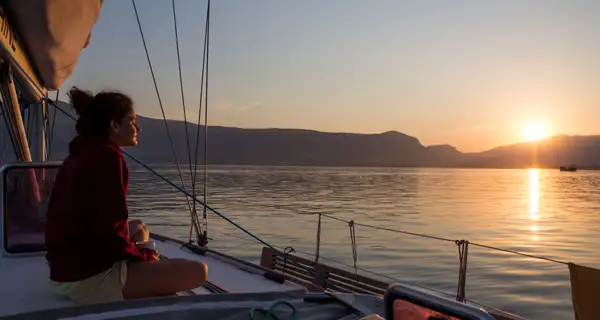
Don’t rush
Everyday life is often already hectic, full of frantic rhythms. At least on vacation, take the time to enjoy the sunsets, the moments, the people, the conversations, and the laughter. Don’t feel the pressure to pin a spot on the map or check off places on a list—savor each moment and let the wind guide you in discovering the area.
The beauty of travel also lies in allowing yourself to be present, without worrying about the final destination. There’s no need to rush: every stop is an opportunity to learn and fully enjoy what’s around you, both in the small things and the big moments.
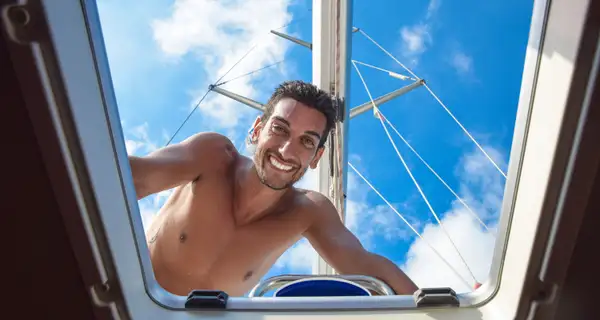
Step forward
If you think more can be done to ensure respect for the environment, step forward and don’t be afraid to speak up: share your thoughts, even on board. On a boat, every action can make a difference, and there’s no need to wait for someone else to take the initiative. Are plastic plates being used? Is recycling not happening? Is there no attention to waste in the sea? You can speak directly to the skipper or, if you prefer, you can share your experience with us: we’re always ready to listen and ask for clarification on onboard behavior.
Every small change, when shared, can help make the boat a more eco-friendly and environmentally respectful place.
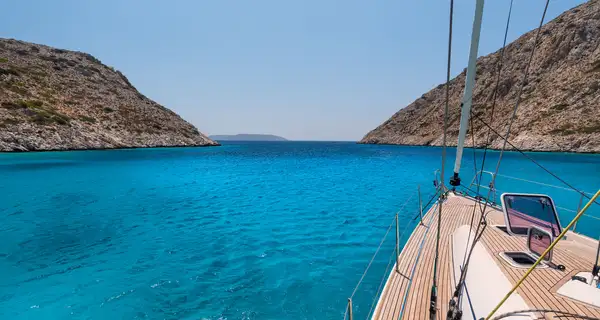
Choose sensible places
Many places are overrun because they’re trendy, promoted by celebrities on social media, or simply considered “must-see” destinations. While these places are undoubtedly beautiful, they can feel overwhelming and lack the tranquility we seek during a vacation. Choose to explore lesser-known spots that are just as stunning but less crowded. You'll not only appreciate their beauty but also the peaceful, exclusive atmosphere, without having to jostle with hundreds of other tourists.
Discovering less-trodden places offers the opportunity to experience a more authentic holiday: a journey that enriches the soul, without the weight of the crowd.
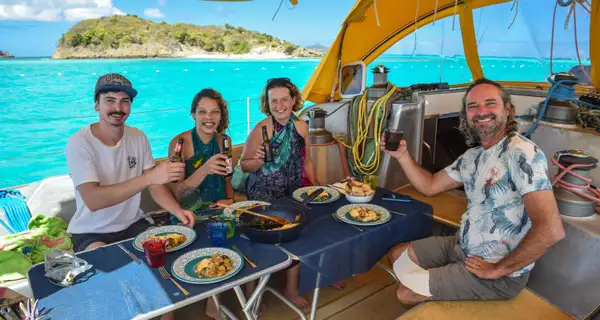
Moderate your expectations
Fridge, freezer, oven, ice maker, beer tap, pod coffee machine, audio system, and air conditioning. There are indeed sailing boats with all these amenities, which certainly provide a high level of comfort, but they also take you further away from the true spirit of a sailing holiday: living at sea with just what’s necessary, without going to the extreme of being uncomfortable, but also without expecting the comforts of home.
If you really can’t stand the heat, choose a boat with A/C, but maybe don’t expect ice to always be ready on board. Life aboard may take away some comforts, but it will give you many emotions and inner well-being in return.

Spend a little more, pollute a little less
On a boat, you mostly wash in the sea, using fresh water from the shower to rinse off. There are special products designed to help "slide" the salt off your skin and hair more easily, while also releasing fewer harmful chemicals into the sea. Solid soaps and shampoos work great, as do shower-shampoos specifically designed for this purpose, which you can find online, such as on the Bodysailing website.
If you can, carefully choose what you bring on board: sustainability isn’t a sacrifice, but a choice that helps preserve the beauty of the sea. Investing in quality products is a way to pollute less and enjoy a more mindful holiday.
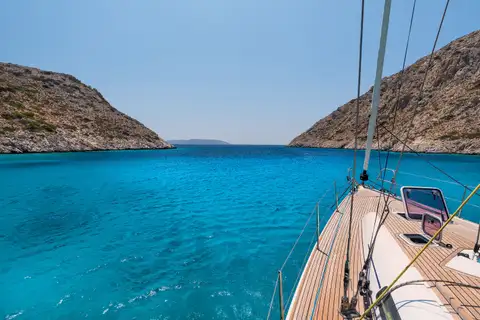
But is a sailing holiday really less impactful?
When comparing the carbon emissions of the main modes of transportation, sailing boats emerge as the most eco-friendly option for travel: they are 15 times less polluting than airplanes, and to put it into perspective, the environmental impact of an Atlantic crossing by sailboat is similar to that of cycling from Paris to New York.
Of course, this result assumes that the movement is entirely powered by the wind and not by the engine, and it applies primarily to a route like the Atlantic crossing, where winds are consistently present. If well planned, the journey can be made entirely without the engine throughout its entire course. Additionally, transatlantic boats are often equipped with solar panels and hydroelectric generators, which allow for the production of the necessary energy for the crossing (autopilot, onboard computers, hydraulic actuators) without needing to use a generator.
After this somewhat extreme example, let’s return to reality: not all boats are equipped with the latest in electrical generation solutions, which is why a trip on a traditional sailing boat shows a higher carbon impact than those of the boats mentioned above. Furthermore, the comfort aboard modern sailing boats requires more energy to operate, thus producing significantly more emissions. According to estimates, the carbon footprint of a sailing trip is still much more eco-friendly than all other modes of transportation in terms of CO2. This low environmental impact is further enhanced by the fact that on a sailboat, a sort of "micro-society" is established, regulated by the economy of water reserves, the frugal use of energy, and the consumption of fresh, local products. Resources must be used sparingly, so long showers, leaving lights on, or spending hours in front of a screen are not possible.
The carbon footprint of a journey does not capture the full extent of the environmental impacts of a mode of transportation. It is important to factor in the infrastructure required for their use (airports, stations, roads, ports, etc.), maintenance operations (oil changes, protective coatings, part replacements, etc.), and the negative externalities generated by their use (road noise pollution, displacement of populations during railway construction, damage to seabeds from anchors, etc.). Although there is still much improvement to be made, sailing trips show very low levels of pollution, far lower than other tourism and transportation alternatives.
Let's talk Sailsquare!



Secure payments



© 2025 Sailsquare Srl SB • All rights reserved - VAT IT07860990964